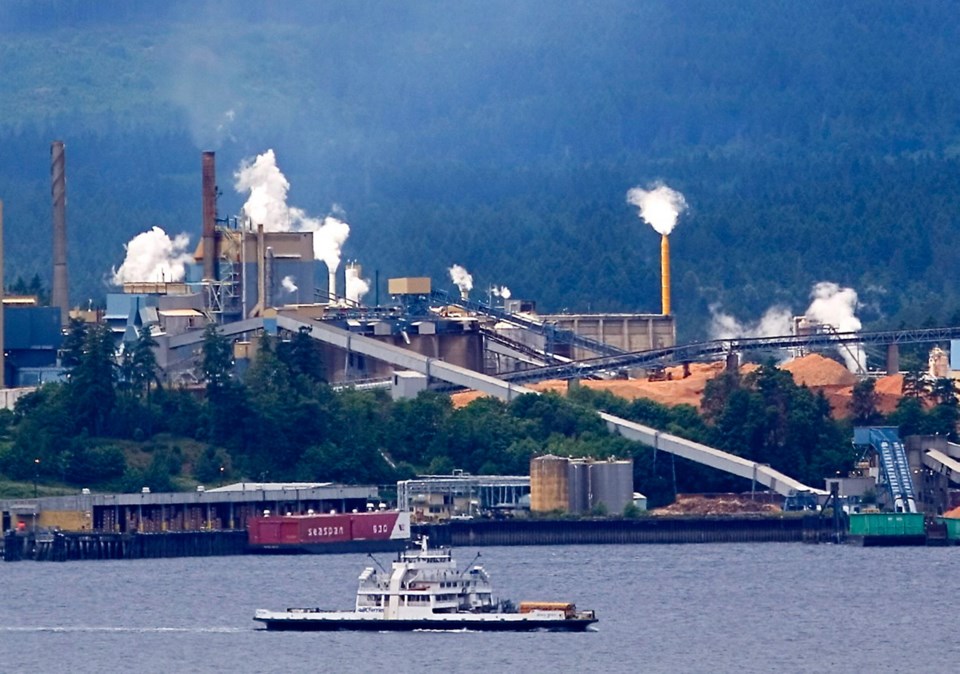 B.C.’s coastal paper mills are on the verge of getting dragged into the never-ending softwood lumber dispute with the U.S.
B.C.’s coastal paper mills are on the verge of getting dragged into the never-ending softwood lumber dispute with the U.S.
A hedge fund that purchased a Washington state paper mill in 2016 is following the path set by some U.S. lumber producers by applying for a duty on Canadian newsprint and other paper on the grounds it is unfairly subsidized and sold in the U.S. for less than market value.
That claim has been made for decades about Canadian lumber imports. It was also levelled about one grade of specialty paper three years ago. But this is the first time it’s been broadened to include a wide range of paper products, including newsprint.
Although Canada has successfully defended itself numerous times against the claims, the cases usually involve negotiated settlements in which duties are applied for lengthy periods, to the benefit of U.S. producers. It’s a model the Washington company, North Pacific Paper, appears to be following, even though it could have severe impacts on U.S. newspapers and other customers.
The firm named seven Canadian paper companies in its complaint to U.S. authorities, including Catalyst Paper, which operates paper mills in Port Alberni, Crofton and Powell River. Catalyst was also included in the earlier trade dispute about a specialty product known as super-calendared paper. That suit was aimed mostly at eastern Canadian producers, but the B.C. company was collateral damage and was required to pay a 19 per cent duty for a time before it was reconsidered and dropped last year.
B.C. forest products expert Kevin Mason said there’s a high likelihood that a new duty will be put in place even though U.S. customers, Canadian suppliers and various observers consider it “ridiculous.” The duty on all Canadian paper sold to the U.S. would likely be in the 15-to-25 per cent range. It would have a broad impact because Canada supplies about 60 per cent of the newsprint used in the U.S.
North Pacific Paper filed for the duty last August, and a preliminary ruling was expected this month. But the company asked for more time to build its case, so the ruling has been delayed until early March. The B.C. Forests Ministry expects to learn the preliminary ruling on a countervailing duty next week, and get the anti-dumping duty in March.
Mason, of ERA Forest Products Research, said the duty would come at the worst time for U.S. newspapers. The industry is in decline, and newsprint demand has been dropping about 10 per cent a year recently. The duty would likely be passed to the customer, meaning a sharp hike in one of the big expense items.
The Wall Street Journal, New York Post and Gannett newspapers are listed among the customers who use Canadian newsprint.
The other paper products included in the claim have a broad range of uses. The battleground for the new trade dispute is largely in the east, which makes the origins of the case in Washington state even more suspect.
North Pacific Paper was formerly a joint venture of Weyerhaeuser Co. and Nippon Paper Industries Co. It was taken over by One Rock Capital Partners LLC.
Mason echoed what fearful U.S. customers are saying: The trade claim is just driven by short-term investment strategies of the new hedge-fund owners. File a complaint, get the government to jack up prices and wear the Canadians down until they cave in.
B.C. shipments of all forms of paper to the U.S. have been shrinking for years. Measured by volume and value, they’re a fraction of what they once were.
So a new duty would be another wound to a trade sector that is already in critical condition. More broadly, the opening of the new front in the trade war confirms again that in all trade dealings with the U.S., the game is rigged.
All the tough talk from past and present B.C. and Canadian leaders about the softwood lumber war has led to nothing more than an expensive new round of appeals to various trade panels that will drag on for years. Now we’ll have another grievance to gnash our teeth over.



